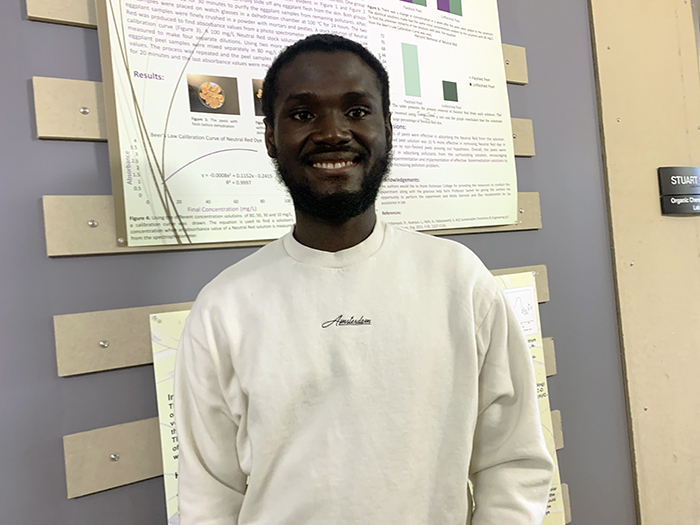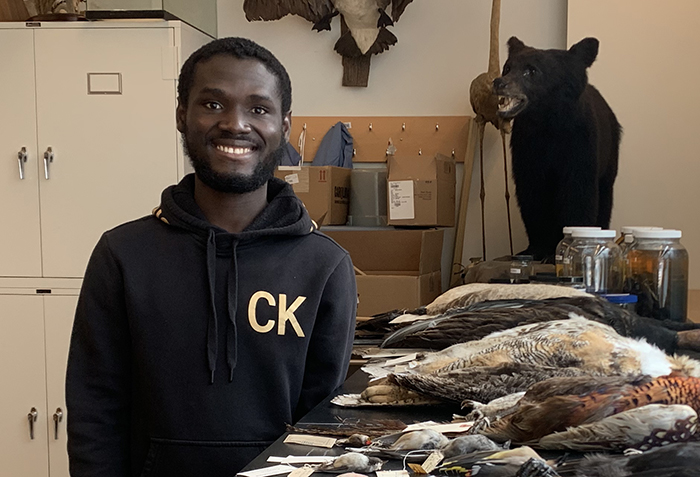Student Snapshot: Daniel Yamoah ’23

Daniel Yamoah ’23 is a biology major with an eye toward a career in medicine—a goal he’s harbored since childhood. And he’s well on his way, with multiple scholarships, a stellar academic record and rewarding student-faculty research experiences. Below, he discusses what he loves best about his major; the class that allowed him to study fish, amphibians, birds and mammals; his advice for younger students; and more.
Hometown:
Kumasi, Ghana.
Major:
Clubs and organizations:
Pre-med Society, Minority Association of Pre-medical Students and Dickinson Christian Fellowship.
Honors/scholarships/awards:
Forney P. George Scholarship, Beacon Scholar, Renaissance Scholar of the Year, Gail Jenkins Anatomy & Physiology Award, Phi Theta Kappa, Dr. Harry Harden Jr. Student Academic Excellence Award, Renaissance Scholar program, STEM Scholars program and Dean’s List.
Favorite book:
The Color Complex by Midge Wilson, Kathy Russell and Ronald Hall.
Favorite movie:
Good Will Hunting.
On choosing to attend Dickinson:
I wanted a small college that provided research opportunities and easy access to professors.
Best thing about my Dickinson experience:
I took a class called Natural History of Vertebrates, and it included an optional spring-break trip. We went for a camping trip at the Wehle Land Conservation Center in Alabama. We would usually wake up in the morning go for a hike through the forest to observe and catch animals by setting up traps. We had experts, such as herpetologists from different colleges and institutions, who would give brief talks on certain organisms.
Favorite place on campus:
Inside Rector.
Best thing about my major:
The opportunity to have hands-on experience is unparalleled. And the professors are very open and accommodating.
As I kid, I wanted to be …
… a physician.

Daniel Yamoah preserved specimens for future students to study through Dickinson's Natural History of Vertebrates class. He says hands-on learning opportunities like these are invaluable in helping to prepare him to serve as a physician.
Favorite class:
I have loved all my classes, but if I am to choose one, it would be Natural History of Vertebrates. The class afforded us the opportunity to observe so many vertebrates in their natural ecosystems at the Conodoguinet Creek, King’s Gap Environmental Educational Center and Yellow Breeches. We used nets to catch fish and observe and identify them. We also set up cameras and decoys in the Tuscarora State Forest and observed images of mammals and birds captured by cameras. And we went to Jerry’s Flat in the Michaux State Forest to observe amphibians. We also used binoculars to observe and identify birds.
Also for this class, we preserved museum-quality mammal skins, birds skins and wet specimens. Some were preserved during the class trip, and some were done on campus, in the lab. These specimens will be cataloged in the college system for other students to study. These preserved specimens can last for years; I even saw one from 19th century.
As someone interested in medicine, working on small mammals and dissecting them is an experience that will help me in my subsequent endeavors.
Little-known hobby/talent:
Cooking.
Post-Dickinson plans:
Right now, I am thinking of pursuing a master’s degree in tumor biology or applying for research positions. After a gap year, I will apply to medical schools.
About my research:
My research group and I are working with Visiting Instructor in Biology Gene Wingert to assess the impact of two predators on ephemeral ponds. Our study focuses on the predation of aquatic newts, predaceous diving beetles and water scavenger beetles on tadpoles. Our findings will underscore the problems we have with the conservation of aquatic communities. Through this research, I have learned about collaborating with people and collecting and assessing data.
Advice for younger students:
Make use of Alumnifire! Through a connection I built, I was able to get a volunteer opportunity at the Sadler Health Center and earn a full-tuition scholarship toward community health worker training.
If I could have dinner with anyone, living or dead, it would be …
… Kwame Nkrumah.
Most important thing I’ve learned so far:
Doors are never opened until you knock, so always knock and ask questions about opportunities.
Read more Student Snapshots.
TAKE THE NEXT STEPS
Published June 27, 2022